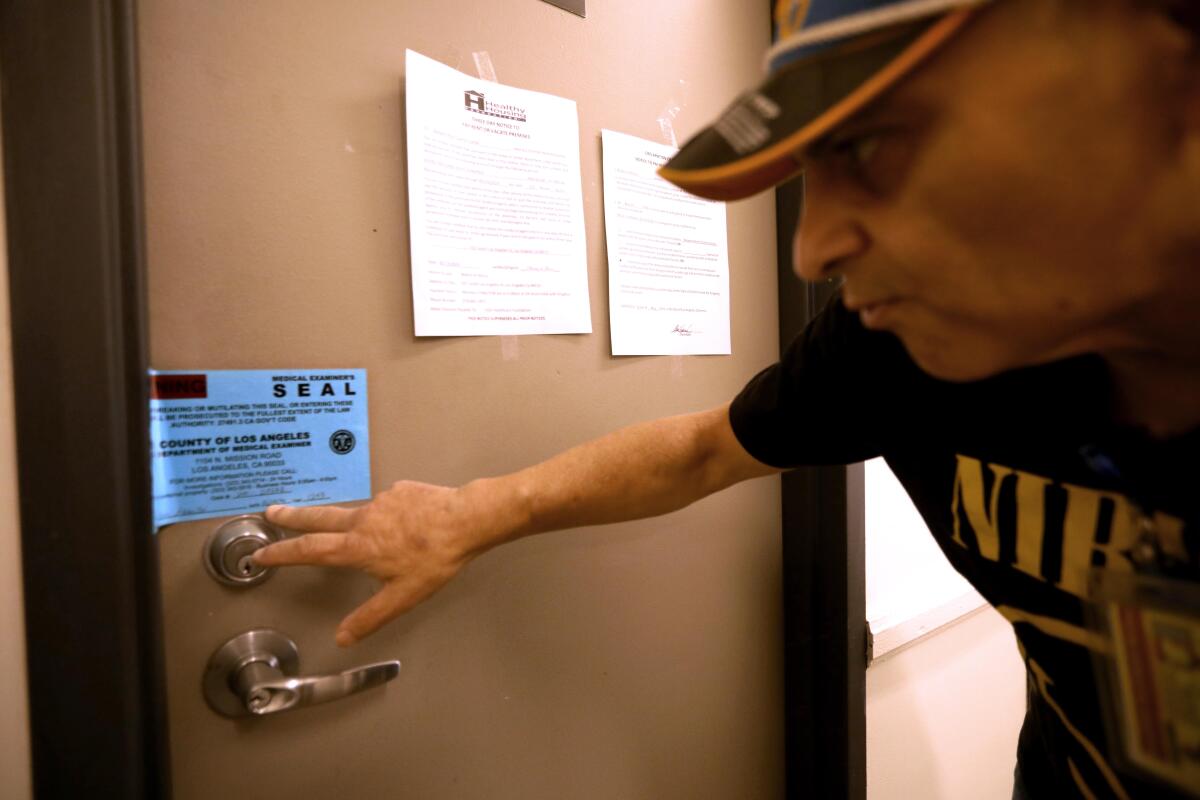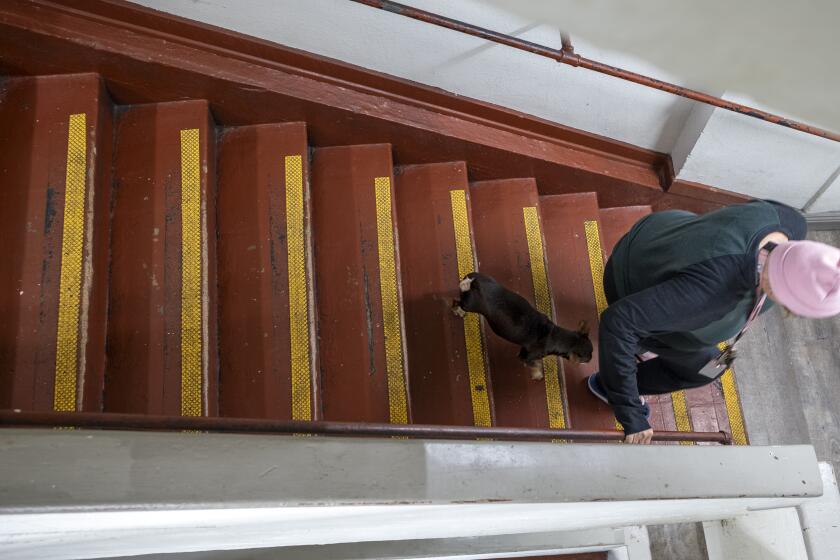HUD gave $10-million tenant organizing grant to L.A. landlord who tenants say blocked their organizing

For nine months, Nash Stabolito has tried to organize a tenant union with fellow residents of his Skid Row single-room occupancy hotel and nearby properties owned by his landlord. In his building, the Baltimore Hotel, Stabolito has photos of cockroach droppings lining doors, mold-like spores dotting walls and a dead rat in a neighbor’s room. Tenants at the other SROs have had similar complaints. Working collectively, Stabolito believes, residents could better their conditions.
But Stabolito said that his landlord, the nonprofit AIDS Healthcare Foundation, has stymied the unionization efforts. The foundation, he said, has stopped him from handing out fliers, blocked union meetings in the buildings and refused to respond to requests for repairs he’s filed on behalf of other residents.
So Stabolito said he was “flabbergasted” to learn that the U.S. Department of Housing and Urban Development this month awarded the foundation $10 million to promote tenant organizing at low-income developments across the country.
“I started cussing,” said Stabolio, 50. “I can’t believe this. They’re fighting me every step of the way.”
Recently, The Times has been investigating Skid Row’s troubled housing providers, digging into the failures of nonprofits such as AIDS Healthcare Foundation.
The HUD award is the latest spotlight on conflicts between the foundation’s attempts to serve both as tenant advocates and Skid Row landlords. The L.A.-based nonprofit, which received $2.5 billion in revenue last year largely from its chain of pharmacies, is one of the nation’s largest funders of tenant’s rights campaigns, including its sponsorship of a November statewide initiative to expand rent control in California. At the same time, the foundation has faced longstanding problems at the more than a dozen low-income housing developments it owns in Los Angeles.
In recent years, the foundation has settled multiple lawsuits filed by tenants, including over a chronically broken elevator at the Madison Hotel and, last week, a class-action case at the Madison alleging pervasive mold, vermin, and plumbing and electrical issues. A Times investigation last fall found widespread evictions, code compliance, public health complaints and drug overdose deaths at foundation properties.
Under the HUD program, the foundation will be responsible for handing out the $10 million over the next two years to tenant advocacy organizations in low-income apartment buildings. The grant’s purpose, per a HUD news release, is to help tenants work with their landlords and hold them accountable for improving conditions.
A Times investigation has found that many of the AIDS Healthcare Foundation’s more than 1,300 residents live in squalid conditions, with dozens under the threat of eviction.
HUD spokesperson Ramzey Smith did not answer questions from The Times about the department’s vetting of the foundation and its qualifications for the grant. Smith said in a statement that the foundation is part of a coalition that will administer the money.
“As an eligible and well-qualified team of awardees, we are confident that these coordinated efforts will empower renters to play active roles in ensuring the safe, quality and affordable homes they deserve,” Smith said.
Foundation spokesperson Jacki Schechner did not respond to questions about the foundation’s stance on unionization within its buildings and related issues, but noted that the organization has nearly 100 active federal grants across the country.
“AHF, as the nation’s largest AIDS organization, has been an esteemed federal grantee at the global, national and local level for 35 years,” Schechner said.
The foundation’s acquisition of low-income buildings began in 2017. Foundation co-founder and president Michael Weinstein boasted that his nonprofit could provide homeless housing cheaper and quicker than public agencies and other nonprofits. The foundation charges rents as low as $400 in its SROs and shuns many government subsidies favored by other low-income housing landlords.
Because the foundation doesn’t own fully HUD-subsidized buildings, it was allowed to apply for the tenant organizing contract.
Money from the HUD program is designed help tenant organizations participate in building management, advocate for preservation of their homes and pay for training, staffing and supplies, the department’s announcement said.
The foundation’s role, in partnership with Massachusetts-based tenant advocates, is to provide and oversee the funding to approximately 30 eligible resident organizations within HUD-subsidized developments. The HUD award to the foundation was first reported by Reason.

Stabolito has sent letters to foundation management, including to Weinstein and the nonprofit’s board members, asking for meetings and formal recognition for the union that he says have been ignored. Stabolito said close to 40 tenants across four foundation properties in Skid Row — the Baltimore, King Edward, Madison and New Hope — are active in the unionization efforts.
Besides habitability issues, Stabolito said tenants want better communication from their landlord. They’ve received no explanation, he said, for a full-day power outage in the Baltimore this month. Some tenants, he said, believe that the foundation isn’t accurately accounting for the rent they’re paying and the union would like to be an intermediary.
Residents alleged pervasive problems within the building, including mold, vermin, plumbing and electrical issues that they said the foundation failed to fix.
“We don’t trust them whatsoever,” Stabolito said of foundation management. “Even less now that this money came in.”
In his room at the Baltimore last week, Stabolito showed a Times reporter and photographer what appeared to be mold on the ceiling of his private bathroom. Down the hall, Michael Konlon, a 57-year-old resident who uses a motorized scooter, said it took the foundation two years to fix the broken shower in his room.
“It’s absolutely impossible” to get timely repairs, Konlon said.

The building showed other signs of management indifference. A second-floor resident in his 80s died from cardiovascular disease in his room in June, according to Kelly Vail, a spokesperson for the County of Los Angeles Medical Examiner. More than three months later, a blue seal from the medical examiner office remained on the door. The body has been removed but investigators have yet to locate next of kin, Vail said.
Landlords can request the seal be discarded, but that hasn’t happened in this instance, she said.
“As of right now, there’s no indication there has been outreach from the landlord/property manager,” Vail said last week.
Taped on the door next to the medical examiner seal was a three-day eviction notice. Foundation management alleged the tenant owed $7,800 in back rent. The notice is dated mid-May.
L.A. city law requires landlords to file such eviction-related documents with the housing department. But the foundation has a history of not reporting the information and the city had no record of the notice.
More to Read
Sign up for Essential California
The most important California stories and recommendations in your inbox every morning.
You may occasionally receive promotional content from the Los Angeles Times.










